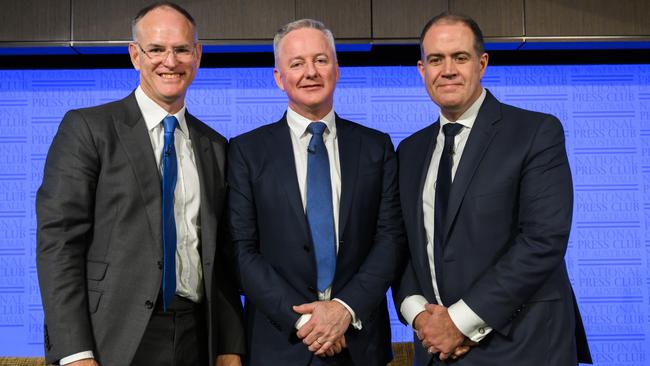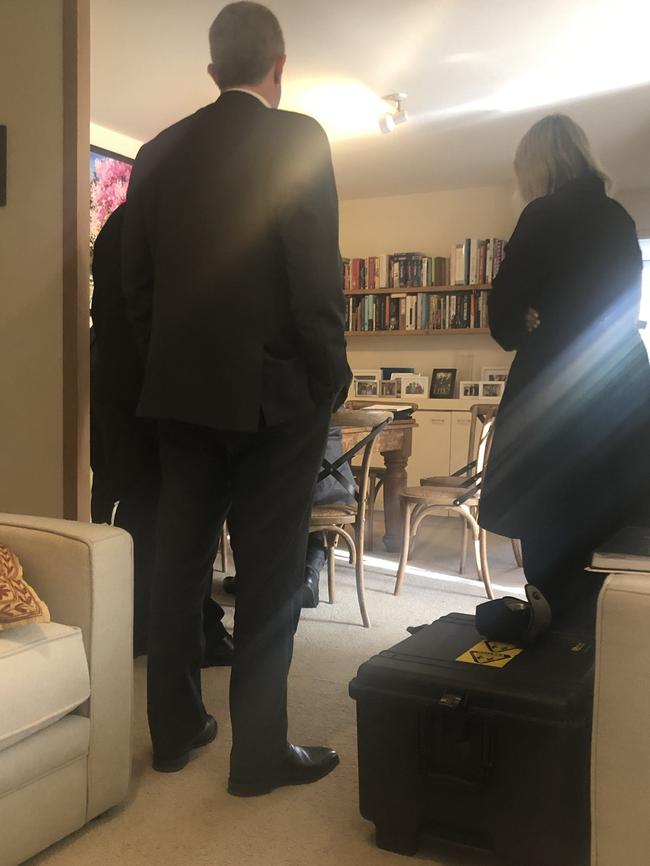Guarding against secrecy
The High Court will decide the validity of contentious laws on press freedom.

The appointment to the bench of ACT magistrate James Lawton has left a lasting impact on reporter Annika Smethurst. Last month she had to stand and watch as police raided her home and rifled through her belongings. They came bearing a search warrant that had been issued by this magistrate four weeks after he joined the bench.
That raid, and a second on the ABC, was based on laws that protect government secrecy from whistleblowers and their allies in the media. They brought to a head the long-simmering conflict over the breadth of laws that restrict what the community is told about government conduct.
To many, the raids have tarnished Australia’s good name as a free society. The New York Times asserted on June 5 that “Australia may well the world’s most secretive democracy”.
But shrill assessments from abroad are premature. The New York Times has bemoaned the fact Australia does not have an equivalent of the first amendment to the US constitution, which says congress “shall make no law” abridging freedom of speech or of the press. That analysis overlooks the fact in this country the rule of law applies to everyone: the police who raid journalists, new magistrates who hand out search warrants and governments that enact secrecy laws that might exceed the limits of the Constitution.
The Americans have their own remedies but there is more than one way to skin a cat. The rule of law and an independent judiciary can be just as effective in holding those in power to account.
Respecting the law
Last week, in the face of domestic and international concern about legal action against journalists, Home Affairs Minister Peter Dutton argued that the law had to be respected: “Nobody is above the law and the police have a job to do under the law.”
Those words are about to take on a meaning that might not have been apparent to the minister.
Smethurst and Nationwide News — a division of News Corp Australia, the ultimate owner of The Australian — filed documents in the High Court on June 26 seeking orders that would strike down the legal basis for the raid for two reasons: the first is that the warrant issued by Lawton is said to be invalid due to legal errors. The second is that they believe the federal secrecy law that underpinned the warrant and the raid is unconstitutional.
The first defendant is Australian Federal Police commissioner Andrew Colvin, who is due to retire in September. Lawton, who was sworn in as a magistrate on May 6 and issued the warrant on June 3, is the second defendant.
If either limb of this challenge succeeds, it would mean that the police who raided Smethurst’s home were not — to use Dutton’s words — doing their job “under the law”. Their actions would then be seen as unlawful — in the sense that they would have no legal excuse for entering the reporter’s home, searching her belongs, including her underwear drawer, and taking away material. Everything would need to be returned. The AFP and Lawton could even be required to pay legal costs.
Fight bigger than media
The significance of this fight is frequently diminished by those who portray it as a struggle to protect journalists. It’s more than that. The real loser when governments abuse secrecy laws is the community. The media is merely a conduit.
Smethurst is the political editor for the Sunday newspapers published by News Corp Australia. Like senior reporters in other free societies, her role is more than a job. She is part of an institution, the fourth estate, whose value to the community rests on the provision of information governments prefer to hide.
The article that triggered the Smethurst raid is a classic example. She revealed last year that Dutton had seen a proposal to permit electronic spying on Australians and that the idea had been rejected by cabinet moderates.

Using secrecy laws to crack down on a reporter over such an article strains the resources of the AFP as well as its credibility. On the day of the raid, the AFP actually said it concerned “an extremely serious matter that has the potential to undermine Australia’s national security”.
On the same day that News Corp’s lawyers were filing the High Court challenge, Michael Miller, the company’s executive chairman for Australasia, was at the National Press Club for the launch of a reform agenda drawn up by 14 mainstream media organisations that form the Right to Know coalition. Miller shared the same platform as ABC managing director David Anderson and Nine Entertainment chief executive Hugh Marks.
By citing legal errors with the search warrant, the Smethurst challenge could focus attention on the main issue on the Right to Know’s agenda: the degree of rigour surrounding the process of issuing search warrants for raids against the media.
At the moment, the AFP — unlike the police in Britain — can raid the media armed with warrants obtained at ex-parte hearings where the media or anyone else is not permitted to attend and test the rigour of the police case.

The High Court’s response to this part of the challenge will inevitably be relevant to a broader inquiry that is being conducted by the Parliamentary Joint Committee on Intelligence and Security. Its terms of reference, provided to the committee eight days after the National Press Club event, require the committee to determine “whether and in what circumstances there could be contested hearings in relation to warrants authorising investigative action in relation to journalists and media organisations”.
The Right to Know’s reform agenda calls for a two-step procedure that would inject a new level of political and legal oversight before newsrooms and journalists’ homes could be raided. The first step would require the federal attorney-general to give approval before search warrants against the media could be sought.
The second step would involve the judiciary. It would put an end to ex-parte hearings and subject the AFP to the rigour of a contested hearing whenever it sought judicial approval to raid the media.
Instead of having warrants issued by magistrates, the Right to Know coalition says these applications should be decided by an independent third party at the same level as a judge of a Supreme Court, the Federal Court or the High Court. The media should be given notice so it can put its case. While the joint committee’s work will cover the main point from the Right to Know’s agenda, the rest of the terms of reference seem to have been designed to shift the inquiry’s focus away from government secrecy.
Whistleblower protection
The second item on the media’s agenda — better protection for public sector whistleblowers — is missing from the terms of reference, as is any reference to the call for a more effective freedom of information regime. Also missing is the media’s proposal for a new classification system that would limit the number of documents that are considered to be secret.
This is an idea that has the backing of one of the nation’s leading silks, Bret Walker SC, who is a former president of the Law Council of Australia as well as being a former independent national security legislation monitor.
Walker has previously called for the introduction of “new overarching legislation that defines in a restrictive manner what information must be kept secret”.
The limited scope of the inquiry’s terms of reference suggests the politicians have little interest in examining whether the public should be given more information about what the government is doing. But by vacating the field on this issue, they have not put it to bed. They have simply cleared the way for the High Court to fill the void.

The second argument in Smethurst’s challenge goes directly to the question of whether government secrecy and national security laws are being misused to improperly stifle debate.
It invites the High Court to consider the way in which the implied constitutional freedom of political communication applies to what the government considers to be “official secrets”. The ABC is running a challenge of its own in the Federal Court that is also expected to focus on the implied constitutional freedom of political communication.
This doctrine is not part of the written text of the Constitution but in April, when the High Court handed down its most recent ruling on the implied freedom, the joint judgment of Chief Justice Susan Kiefel and judges Virginia Bell and Patrick Keane made it clear this was an established part of the constitutional structure.
“It is well settled that the implied freedom is a limitation upon the power of government to regulate communication relating to matters of government and politics,” they say in a case known as Clubb v Edwards.
It protects the freedom to communicate on matters of government and politics because this is an implied part of the Constitution due to the need for the community to be able to make informed decisions at federal elections.
The application outlining Smethurst’s challenge contains a detailed critique of section 79(3) of the Crimes Act, which covered government secrecy at the time Smethurst published her article.
That critique is designed to persuade the court that this statute breaches the implied freedom and should be struck down as invalid.
It says this provision operates whenever the executive government of the commonwealth uses “an opaque and in practice unreviewable course of executive action” to deem material secret for any reason, such as a directive by a senior public servant.
“The duty to keep information secret, and with it the classification of the information as ‘prescribed’, exists irrespective of whether the material in questions is … already in the public domain, wholly innocuous, or merely embarrassing to the government or its individual officers,” the application says.
“These features of section 79(3) demonstrate that it is not directed to a legitimate object, such as to maintaining national security.
“Rather its object is the impermissible object of protecting government secrecy as an end in itself, whether or not that secrecy can be justified in the national interest.
“Conferring on unidentified members of the executive government the ability to prevent the dissemination of information solely on the basis that they think it should be kept secret (for instance because it may cause embarrassment to the government) is not consistent with the constitutionally prescribed system of representative and responsible government,” Smethurst’s application says.
If this argument is accepted by the High Court, or is even the subject of judicial consideration, it could help persuade ministers and senior bureaucrats that it is not in their interest to play dead on government secrecy.
One way or another, the time to bring balance to this area of law might be at hand.
However, there is one aspect of the High Court’s jurisprudence that needs to be kept in mind.
The court’s ruling in April seemingly indicates that it decides cases on other grounds before turning to the requirements of the Constitution.
So if the Smethurst challenge succeeds, the government might have an interest in hoping that it is due to legal errors in the search warrant, not the impact of the implied constitutional freedom.
If the argument is decided on constitutional grounds, government secrecy will still exist but abuse of this power could begin to subside.




To join the conversation, please log in. Don't have an account? Register
Join the conversation, you are commenting as Logout